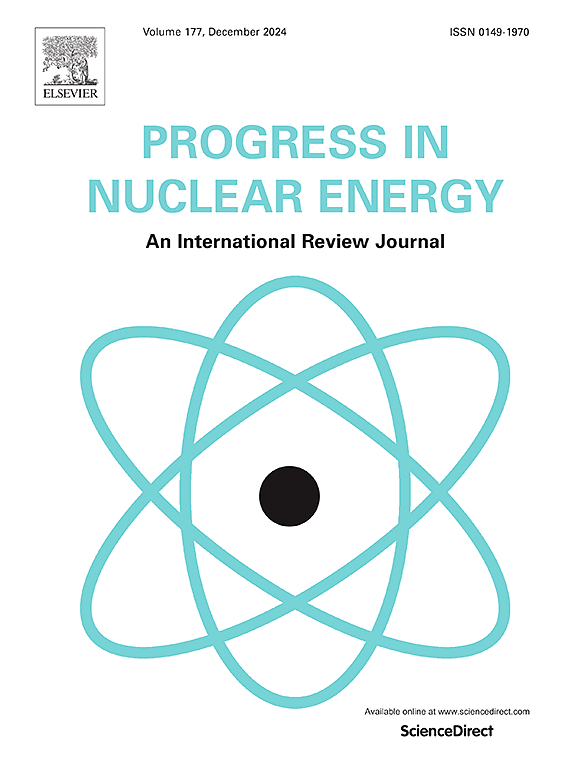Challenges of small modular reactors: A comprehensive exploration of economic and waste uncertainties associated with U.S. small modular reactor designs
IF 3.2
3区 工程技术
Q1 NUCLEAR SCIENCE & TECHNOLOGY
引用次数: 0
Abstract
This article presents a comprehensive analysis and review of the levelized cost of electricity (LCOE) and nuclear waste generation from small modular reactors (SMRs) designed in the United States. The analysis presented here offers a perspective on the uncertainties surrounding the calculation of LCOE for SMRs. Initially, the paper discusses and calculates the capital costs, front-end fuel cycle costs, operating and maintenance expenses, and nuclear waste production of four distinct types of SMRs—boiling light water, pressurized light water, high-temperature gas-cooled, and sodium fast reactor types— based on designs by four different manufacturers in the United States. Our review and analysis indicate there is considerable uncertainty in LCOE estimations of SMRs, particularly emphasizing that non-light water designs are likely to be more expensive in fuel cycle costs and have greater uncertainties in nuclear waste management compared to light water reactor designs. This comprehensive analysis of SMRs significantly broadens our understanding of their economic complexities and the implications these pose for deployment in the foreseeable future. Lastly, our estimates suggest that both SMRs and large nuclear reactors will require revolutionary approaches to reduce the capital cost overruns to be cost competitive with other energy sources.
小型模块化反应堆的挑战:与美国小型模块化反应堆设计相关的经济和废物不确定性的全面探索
本文对美国设计的小型模块化反应堆(SMRs)的平准化电力成本(LCOE)和核废料产生进行了全面的分析和回顾。本文的分析提供了一个视角,说明了围绕计算中小企业成本成本的不确定性。首先,本文根据美国四家不同制造商的设计,讨论并计算了四种不同类型的smr(沸水轻水、加压轻水、高温气冷和钠快堆)的资金成本、前端燃料循环成本、运行和维护费用以及核废料产生。我们的回顾和分析表明,小型反应堆的LCOE估计存在相当大的不确定性,特别强调与轻水反应堆设计相比,非轻水设计在燃料循环成本方面可能更昂贵,并且在核废料管理方面具有更大的不确定性。对小型反应堆的全面分析大大拓宽了我们对其经济复杂性的理解,以及这些对可预见的未来部署的影响。最后,我们的估计表明,无论是小型反应堆还是大型核反应堆,都需要革命性的方法来减少资本成本超支,从而在成本上与其他能源具有竞争力。
本文章由计算机程序翻译,如有差异,请以英文原文为准。
求助全文
约1分钟内获得全文
求助全文
来源期刊

Progress in Nuclear Energy
工程技术-核科学技术
CiteScore
5.30
自引率
14.80%
发文量
331
审稿时长
3.5 months
期刊介绍:
Progress in Nuclear Energy is an international review journal covering all aspects of nuclear science and engineering. In keeping with the maturity of nuclear power, articles on safety, siting and environmental problems are encouraged, as are those associated with economics and fuel management. However, basic physics and engineering will remain an important aspect of the editorial policy. Articles published are either of a review nature or present new material in more depth. They are aimed at researchers and technically-oriented managers working in the nuclear energy field.
Please note the following:
1) PNE seeks high quality research papers which are medium to long in length. Short research papers should be submitted to the journal Annals in Nuclear Energy.
2) PNE reserves the right to reject papers which are based solely on routine application of computer codes used to produce reactor designs or explain existing reactor phenomena. Such papers, although worthy, are best left as laboratory reports whereas Progress in Nuclear Energy seeks papers of originality, which are archival in nature, in the fields of mathematical and experimental nuclear technology, including fission, fusion (blanket physics, radiation damage), safety, materials aspects, economics, etc.
3) Review papers, which may occasionally be invited, are particularly sought by the journal in these fields.
 求助内容:
求助内容: 应助结果提醒方式:
应助结果提醒方式:


